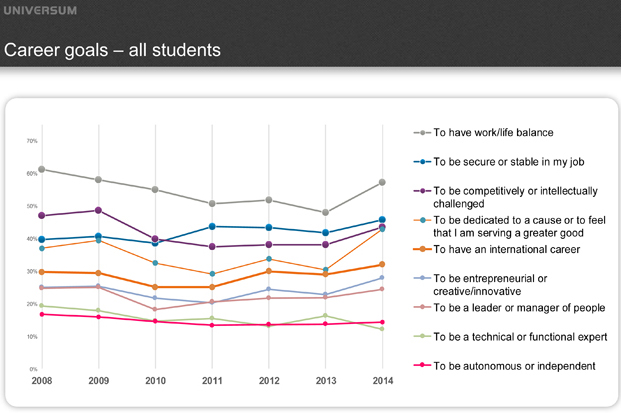

‘The Future of Work’ report published by the UK Commission for Employment and Skills in 2014 contained the startling statistic that “92 per cent of Gen Y participants identify flexibility as a top priority when selecting a workplace.”
Other research into the career priorities of this generation (those born between about 1980 and 2000 and sometimes also called Millennials) further supports the view that they place a high premium on work-life balance.

Research company Universum polls students annually on career and employment aspirations and asks them to pick their top three career goals from a list of nine options. Since 2008 “to have work/life balance” has consistently come out as the most popular goal among UK students, ahead of having job security or intellectual/competitive challenge. Admittedly, neither salary nor career progression were included amongst the nine options, but the results are nevertheless compelling.
What are students telling employers?
So are employers noticing this trend? Imogen O’Mahony, PwC’s Campus Engagement Manager- Diversity, says graduates are definitely asking more about work-life balance than they used to.
“It’s not necessarily about part time or having a family, but the ability to manage work around life, to carry on doing things outside work,” she says. “Graduates ask about the long hours culture in the City. They want to know if they can still have a life – they don’t necessarily have a specific reason in mind. But they want the freedom.”
Charlie Ball, deputy head of research at the Higher Education Careers Services Unit says that the increasing prevalence of flexible working among all generations of workers is filtering down to younger people. “We do know that people consider flexible working when looking for a job, but it’s hard to get a handle on how much,” he says. “Once you prompt people, they tend to be positive and say they are interested.”
Once experienced, never forgotten
There’s certainly plenty of anecdotal evidence that people who experience flexible working can’t imagine going back to rigid work hours – whatever their career stage.
In the public sector, Ellen Care, Internal Communications Officer for the London Borough of Bexley, is a good example. She joined the Local Government Association’s National Graduate Development Programme in 2012 and works one a day a week from home, because of a 40 mile commute.
Apart from saving travel time, Ellen finds her day from home helps her work more effectively when she has to write a report, for example, and makes it easier to arrange activities after work that day. Although flexible working wasn’t a high priority when she started work, Ellen can’t now imagine doing without it.
“I’d find it hard to give it up. It just makes so much sense as a way of working,” she says. “I can see myself staying in local government because of flexible working, because as my life changes, maybe with family commitments, I will be able to change the way I work.
“It’s really important to have the opportunity to work in different ways when you need to.”
One of the striking things about Ellen’s work pattern is that just one day a week at home is making such a difference. This would not surprise members of research group the Hidden Brain Drain Task Force, in the US, which did extensive research into the work preferences of Millennials and Baby Boomers in 2009 and found that 69% of Millennials said they wanted more remote working options, with more than half of these wanting to work just one day a week from home.
Lana Northey, who joined the LGA’s National Graduate Development Programme in 2009, is also enthusiastic about flexible working. She works in the adult social care department at Leeds City Council in a team that has flexible hours, home working by arrangement and lets employees accumulate hours and then take “flexi-days” off.
Lana comes to work late on Wednesdays because she volunteers on Tuesday nights, but usually starts at 7:30am or 8am on other days, because it suits her work style.
“I work better,” she says. “I’m never clock-watching. If I’m working well, I keep going, and if I’m not, I stop. It means I do my work at the times when I work best and feel motivated. I feel in control of my work pattern, and I really appreciate that,” she says.
“The work-life idea means a lot to me. I’ve never worked 9-5 hours and wouldn’t want to now. A new job would have to be significantly more money for me to give up the flexibility.”
Published January 2015